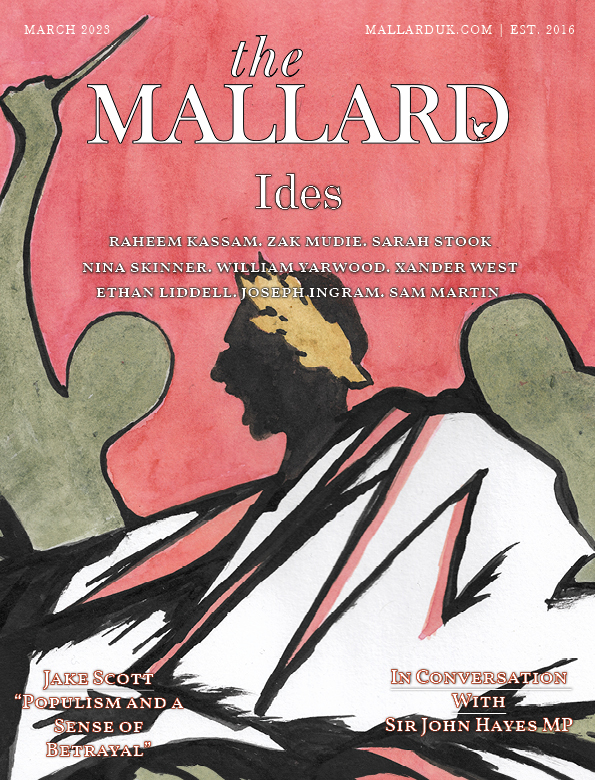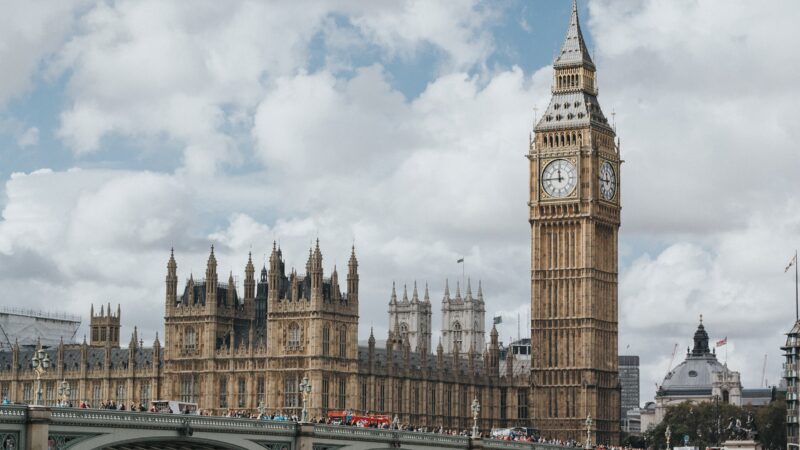Just Stop Crime!
Well, they finally got one. At long last, the notoriously useless Met has mustered the willpower to put down the biscuit tin and arrest someone worthwhile.
Too bad he got a measly fine, though.
Bacari Ogarro, also known as Mizzy, is a now infamous “Content Creator” (translation: obnoxiously unemployed) courtesy of his TikToks.
Ogarro’s most well-known ‘work’ includes stealing an elderly woman’s pet dog, threatening to kill random people, harassing women at night and in public places, trespassing into people’s homes and cars, and destroying books in local libraries.
Light-hearted stuff, for sure.
In a serious country, a viral Twitter thread and an online campaign wouldn’t be necessary to get the police to do its job; the modus operandi of any police force should be to keep anti-social types like Ogarro away from civilised society.
Unfortunately, as we all know, Modern Britain is not a serious country. Theft, harrassment, and trespassing are defacto legal, hence why Ogarro was able to post himself engaging in all three without consequence until a few days ago.
Many have remarked that Ogarro’s actions, especially waltzing into someone’s private property, wouldn’t end so well in the United States.
There’s some truth to this. Although any successful attempt at protecting one’s livelihood, even in the United States, carries the non-zero risk of media-assisted backlash – blubbering processions of apologists, resentfully insisting that a serial criminal was actually a sweet baby boy, and other pathetic delusions, potentially interspersed with some Peaceful Protests.
That said, those telling Ogarro to count his blessings overlook the fact he’s self aware:
“I’m a Black male doing these things and that’s why there’s such an uproar on the internet.”
“I always know outrage is going to happen. I know exactly what I’m doing and the consequences of my actions.”
Ogarro is likely aware that someone of his profile is disproportionately involved (or, perhaps to his ethnonarcissistic mind, racistly perceived to be involved) in gang violence in London, and understands how destructive it can be for people to behave as if this is the case, especially when threatened with violence!
Consequently, he’s unafraid to creep on random women in the early hours or threaten to kill men in broad daylight in pursuit of viral content.
Of course, all of this flies in this face of creating a high-trust society.
I’d like to imagine that any civilised society would respond to snatching an elderly woman’s canine companion – possibly her only companion – especially for the sake of clout, with a swift and painful execution.
Seeing that little dog, distressed and helpless, beholden to the self-aborbed malice of a TikTok prankster, makes it impossible to oppose death squads patrolling the streets, violently exploding the head of any pet-snatcher that crosses their peripheral vision.
After all, those that are cruel to animals will almost certainly be cruel to humans.
As Schopenhauer says, compassion for animals is intimately associated with goodness of character, and that he who is cruel to animals cannot be a good man.
It demonstrates an unrepentant lack of mercy or perspective.
Indeed, Ogarro’s more recent comments, made in an interview with Piers Morgan, show a total lack of perspective.
“This whole public uproar just makes me laugh because people are getting hurt over something that didn’t happen to them and that’s how I see it as.”
“But I wasn’t threatened with physical violence. But I didn’t have my dog stolen. But I did have breakfast this morning.”
Of course, and again, unfortunately, Modern Britain is too scared, incompetent, and unimaginative to pursue the purity of justice.
Instead, it prefers to oppress those who try to resist wanton mistreatment.
The backlash against Just Stop Oil’s recent protest is a contemporaneous example.
Already under economic strain, compounded by the unwillingness of the political class to build energy infrastructure, commuters didn’t take kindly to being met with a road blockade of eco-activists.
The commuters attempted to clear them out, but were swiftly mandhandled, and eventually arrested, by police officers – all of whom were happy to let the activists to create an obstruction, despite their insistence that they were “dealing with it”.
Given this, it’s unsurprising that MPs are using Ogarro’s rise to prominence as an excuse to hurry through the Online Safety Bill.
Putting aside the excessive and anarcho-tyrannic censorship contained within, the perverse implication is that TikTok’s “platforming” of Ogarro’s behaviour is more egregious than the behaviour itself.
“I’m cool with theft, intimidation, and trespassing, just do it in private” is as lolbert as it is psychologically revealing.
If the public doesn’t know about a problem, then the problem doesn’t exist. No wonder Hancock was so prepared to cheat on his wife!
In this case, politicians can’t be bothered (or don’t know how) to tackle crime, so they opt (or are forced) to pursue the pretence of tackling crime.
If Ogarro can point out the basic fact that our laws are superficial and weak, why can’t any of our politicians?
Condescending advertisements – “Mates Don’t Let Mates Be Perverts” – doesn’t prevent women from being harassed by sociopaths on the train, especially when bystanders know they’ll get into trouble if they intervene.
Politics is bloated with Very Important Very Nuanced Terribly Complicated Conversations; Conversations upon Conservations! Conversations we’re Having and Conversations we Should Be Having.
Ogarro? Very problematic. Very problematic, indeed. That’s why it’s important to ensure that he’s part of this conservation No Longer.
That’s right. You’re nicked, sunshine! Yeah. I BANISH YOU from The App for your overt and continuously criminal behaviour which you do literally In Real Life.
Ah, another tinkering twist of the ol’ managerial-therapeutic apparatus never fails! GOD. We are a Sensible country.
No! For the love of God, no! Enough of the limp-wristed half-measures and cowardly indirectness, enough of the mate-mate-mateing and the PR voodoo.
Clear the smoke, smash the mirrors, and unleash the cops; restore the foundational principle of governance: Just Stop Crime!
Enjoying The Mallard? Consider subscribing to our monthly magazine.












A Sensible Proposal (Magazine Excerpt)
Britain is in decline. This much is true. Nobody would dare suggest otherwise – unless, of course, they wish to attest to pure ignorance or twisted glee.
Given this, we are very much in need of sweeping reform. Yet reform is not the product of drawn-out pontification. Ultimately, it is the sum of action: action moulded by proposition.
As such, dear reader, allow me to do just that. May I present to you: A Sensible Proposal.
Shrink the cabinet to its 5 or 6 most capable members, empower ministers to fire civil servants at will, and slash the civil service by at least 75% – it’s not technically Moldbuggian RAGE (Retire All Government Employees), but it’s of the same spirit.
Take the Civil Service Code and throw it on the regulatory bonfire, along with every obstructive procurement rule preventing us from becoming the AI capital of Europe.
Implement mandatory IQ tests for all new civil service hires and scrap the counter-intuitive stakeholder model of policy-making; ensuring government bureaucrats literally, not figuratively, live in The Real World.
Double the length of every sentence, especially for crimes which make civilised society impossible (murder, rape, theft, schmonking weed, etc.). Freedom, if nothing else, should mean the ability to go from A to B without being mugged, molested, or murdered.
Repeat offenders should receive at least one of the following: an extended sentence, a life sentence, chemical castration, or the death penalty. Tough on Crime, Tough on The Causes of Crime.
Abolish the Communication Act and its statutory predecessors to make speech free again. The less time the plod can spend harassing you for tweeting facts and logic, the more time they’ll dedicate to brutalising groomers of our nation’s children, vandals of our nation’s heritage, and abusers of animals.
Furthermore, abolish the Supreme Court and bring back the Law Lords – Tony Blair and Gordon Brown, eat your precious ‘modernising’ hearts out!
Speaking of which, if we can hand out titles to cronies, half-wits, and dodgy sorts, I’m sure we can take them away – put some actual aristocrats in Parliament; of spirit in the Commons and of blood in the Lords.
Abolish the TV licence fee and replace it with nothing. That or broadcast stuff worth watching – like reruns of Kenneth Clark’s Civilisation series or Spy x Family.
This is an excerpt from “Mayday! Mayday!”. To continue reading, visit The Mallard’s Shopify.
Photo Credit.